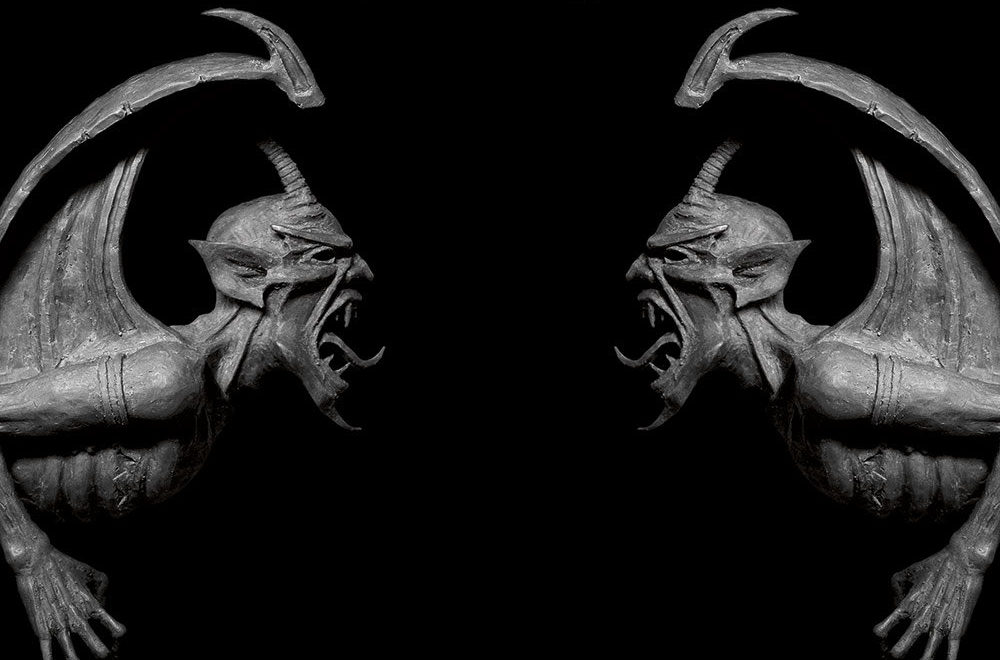I have noticed that there is a large variety found in heavy metal. Yes, I understand this is probably completely breaking news to you, but there is a lot of it out there. What I really mean is that, aside from styles and thematic qualities, metal, like other forms of music, has more specific aesthetic attributes. The past year’s albums have been a wide array of musicians who live between being more tied to the realm of reality or a part of a fictional universe. Previously, the newest Darkthrone feels like an album made by a group of individuals rather than the new record from Paysage D’ Hiver, which resides on the border between reality and fiction. Other bands live in fictional worlds all their own and make music for that place. “Cinematic” is not a genre, rather an attribute, which can be attached to a band who makes it their goal in life to make music for a world inhabited by international demons.
Rotting Christ is a Greek based metal act that started in the arms of black metal and has thus wandered off to explore new things. It’s unfair to expect a band to stay the same when nearing their third decade in existence. Whether or not it was black metal or their strange goth phase, Rotting Christ has been consistent. The group’s creators Themis and Sakis Tolis have consistently created each album to be a part of a narrative that stretches back to 1993. In 2013? Oh, you know, a bit of this and a bit of that. A bit of Greek lore and a bit of choral chanting.
Κατά τον δαίμονα εαυτού continues the direction heard in 2010’s Aealo, though this continues in the direction they have followed since the group’s inception. The handful of gothic influenced records, combined with the more raw black metal ones, were the foundation the band used to refine, temper, and shape themselves throughout the 2000’s. I feel Aealo hit a stride, which projected the band further than they have gone before. The sound was much more streamlined, and as mentioned before, the album occupied a space in a fictional realm. No longer was this a blackened metal band but rather a distant call from another time and space. It is the same universe inhabited by Melechesh and other metal bands concerned with ancient mythology outside the Occident. Κατά τον δαίμονα εαυτού, like predecessors, does the same but with a greater focus. We are way beyond the meridian now.
One of the most striking features of Κατά τον δαίμονα εαυτού is the drums. Drumming is very important to metal but Rotting Christ makes it into near worship. Not only are standard metal percussion employed but low registering drums segment the album, which calls forth choirs to fill the air. It is an atmopshere which is both effective and mesmerizing. With both of these elements in place, Rotting Christ executes an incredibly smooth and streamlined form of metal that is both entertaining and “cinematic.” Take this and sprinkle in some folk instruments to accent the costume and one has a full production. I feel this formula has been used before, however Rotting Christ never ceases to make this tested style enjoyable. If there is a constant in this world, it is the fact that Rotting Christ will make music that sounds like it belongs in a television special on Spartan warfare.
Κατά τον δαίμονα εαυτού splits its time, thematically, between various mythologies and mysticism. The album’s geographical location is not static as its themes drift through an array of languages. With each new area, the band carries totems and trinkets of the arcane leading to an international coven of evil. “Grandis Spiritus Diavolos” revels in the waters of centuries old mysticism and combined with other tracks like “Iwa Voodoo” and “Cine iubeşte şi lasă” present a nondescript embrace of the arcane. Nothing rooted in reality mind you but effective all the same.
Despite my near enjoyment of this record, I was surprised to find so many mixed reviews. One of the largest criticisms of Κατά τον δαίμονα εαυτού is its inability to break away from formulas created by the band over the course of ten years. There is little I can say in the band’s defense as Κατά τον δαίμονα εαυτού hardly breaks new ground. As an album, it works for its purpose and, at this moment, it feels right. I think one of the hardest things to rationalize is emotional responses. Κατά τον δαίμονα εαυτούset led me into a world where everything made sense. It was a distant land populated with international demons and arcane knowledge. It may not be very innovative compared to previous records, but for now, it’s a nice place to call home.
Tags: Hollywood Metal, Kaptain Carbon, Rotting Christ, Κατά τον δαίμονα εαυτούCategorised in: Metal

